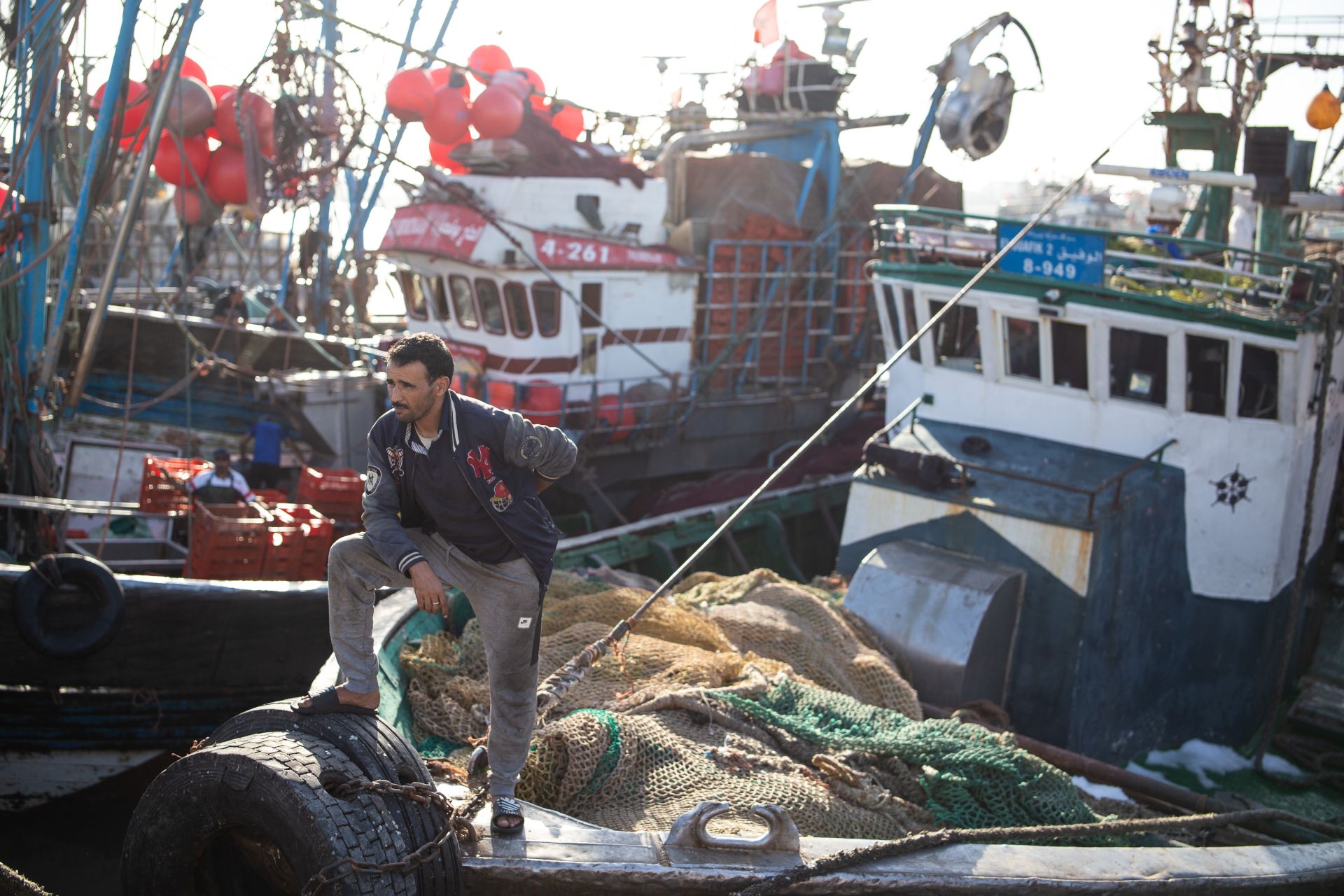In the long afternoon light reflecting off the dark waters of the North Atlantic, fishermen shovel ice from refrigerated trucks onto stacks of sardines and sea bream at the Port of Laayoune, a bustling commercial hub in Western Sahara that has become a focal point for one of Africa’s most complex and drawn-out conflicts. The fish — caught in the abundant waters off the otherwise arid territory — are packed into trucks and shipped hundreds of miles north, to Morocco, and from there to destinations further afield, including the European Union. That trajectory, and the complex web of geopolitics and international regulations that surrounds it, have come under increased scrutiny as some of the citizens of Western Sahara — who view Morocco as an occupying force on their land — vie to reclaim the rights to their territory’s riches.
Morocco considers Western Sahara one of its southern provinces, having laid claim to it in 1957. Since Spain’s withdrawal from Morocco in 1975, it has controlled roughly 80% of Western Sahara’s territory. The remaining 20% is under the rule of the self-declared Sahrawi Arab Democratic Republic, which 46 United Nations member states recognize. Neither the EU nor the U.N. officially recognizes Morocco’s claims over the occupied territory, but the lines are blurred when doing business on the ground.
The inclusion of Western Sahara’s products and fishing waters in the EU’s agreements with Morocco has instigated a series of legal proceedings before the EU Court of Justice. In July, a four-year Sustainable Fisheries Partnership Agreement between the EU and Morocco, which included a 208 million euro contribution for access to fishing zones and to support the Moroccan fisheries sector, expired. The EU Court of Justice has already ruled, on six occasions, that Western Sahara cannot be seen as part of Morocco and that the EU trade and fisheries agreement cannot be applied to the occupied territory.
Pro-independence advocates in Western Sahara argue that the SFPA has been a channel through which the EU informally recognizes Moroccan control of the territory. Some researchers argue that the agreement was made in the knowledge that it would perpetuate the exploitation of natural resources in Western Sahara.
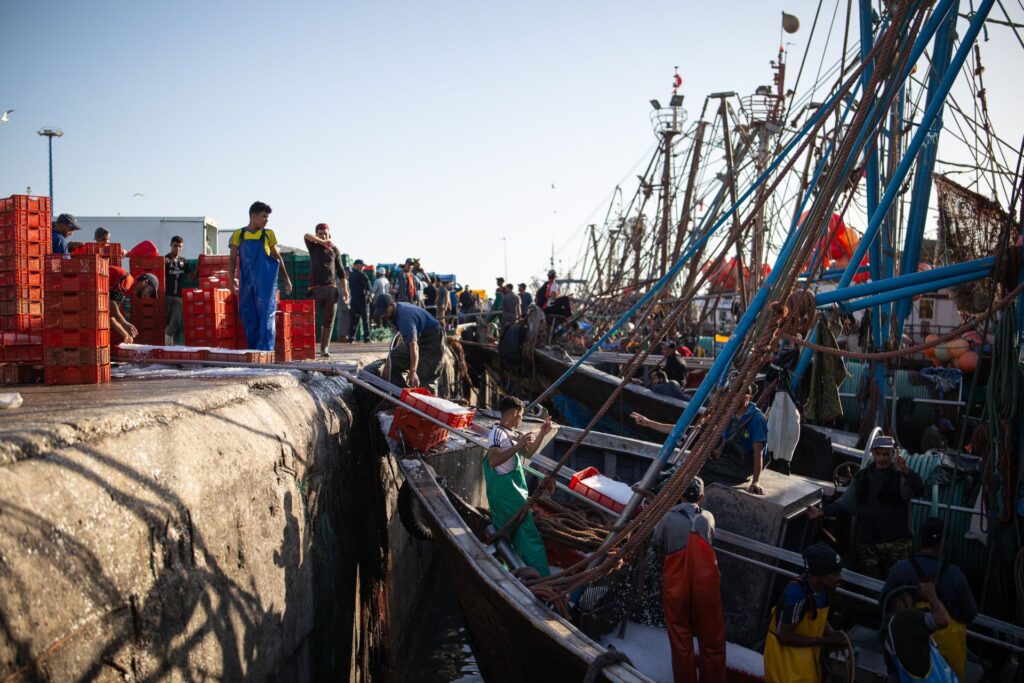
The EU has been prevaricating over its stance on Western Sahara since initiating fisheries and trade cooperation with Morocco in 1988. Despite presiding over questions of EU-Morocco trade legality in its Court of Justice, the EU has not necessarily been abiding by its rulings. A recommendation report by the EU Committee on Fisheries in 2011 observed that, “The rapporteur has … found it difficult to work with the European Commission when drafting this recommendation,” adding that the lengthy process of reporting “has put the fishermen concerned in a rather distressing position, because of the uncertainty of the future.”
On Sept. 29, 2021, the EU General Court ruled that the trade agreement could not be applied to Western Sahara, given the lack of consent from the Sahrawi independence movement known as the Polisario Front, which serves as Western Sahara’s legal representative. In December 2021, the EU Commission appealed the ruling. The final decision will come out later in 2023.
Yet the EU Commission has been forging onward with expanding fisheries activities in Western Saharan waters. Without awaiting the outcome of the appeal, the Directorate-General for Maritime Affairs and Fisheries of the European Commission ordered the fisheries consultancy Poseidon Aquatic Resource to proceed with an ex-ante evaluation, exploring operational expansion strategies based on the current geographic scope of the expiring protocol.
Both the EU and Morocco have good reasons to turn to Western Sahara’s bountiful waters. After years of overfishing and poor management, fish populations have been dwindling along Morocco’s coasts. The western port of Essaouira, a trading hub since the era of the Carthaginians and Phoenicians, has seen a precipitous decline in recent years. In 2021, the last year for which data is available, the National Fisheries Office reported a 47% decrease in the volume of fish products departing from the port, compared to the previous year.
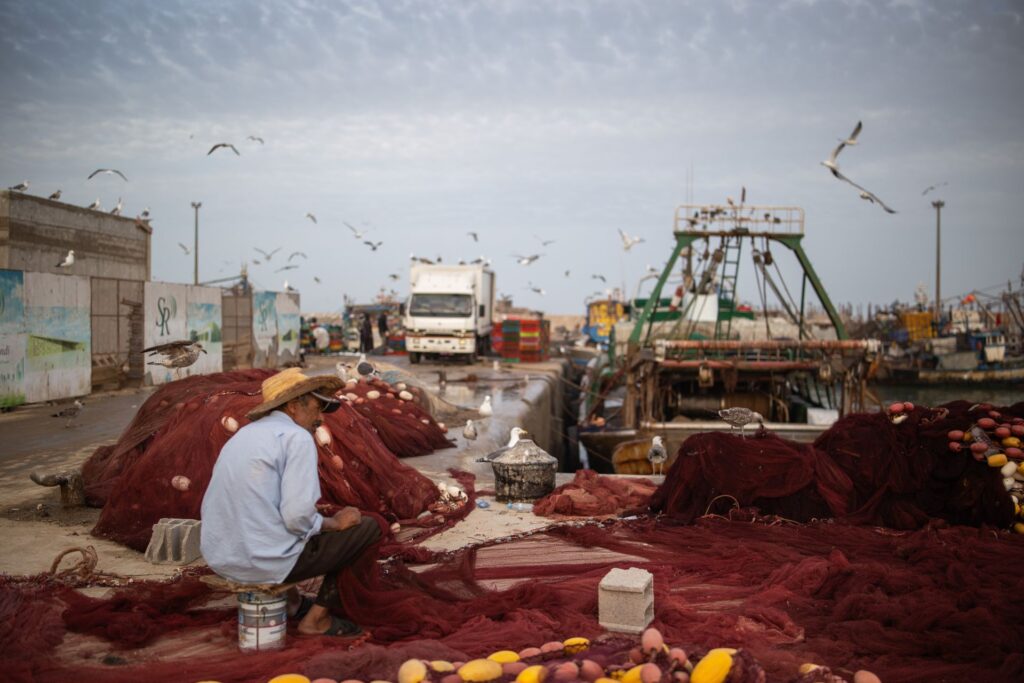
On a clear morning last October, Essaouira’s harbor seemed nearly devoid of life; only a few small boats were unloading their catches from the night. Abdel, in his 60s, indicated where he used to dock his boat. “I retired a few years ago, but still come back here to see how the young men are doing these days,” he told New Lines. “The seas are barren now compared to 30 years ago.” As he wandered past old men lounging on piles of abandoned fishing nets, he told me the government “said they would build up a new section of the port, but who knows when that will happen.”
Meanwhile, Western Sahara is on an economic uptick. In 2018, the trade body Europeche found that the territory sourced 94% of EU catches under the EU-Morocco Fisheries Agreement. Its waters are frigid and experience upwellings from the Canary Current, which are rich in nutrients and conducive to coastal biodiversity. Hmida Atmani, an economic fisheries researcher with the National Institute of Fisheries Research (INRH), has described the opening of the “southern ports” — meaning those in Western Sahara’s territory — as among the most “outstanding events” in the recent history of the nation’s fisheries, and the opening of Laayoune Port as a “new breath” providing plentiful resources for the processing industry.
Mustapha Bez is a fisherman from Sidi Kaouki, a small town outside Essaouira, who went to Laayoune for better fishing opportunities, given Morocco’s relative economic stagnation. He specializes in sardine fishing and said that the catch is shipped abroad to places like France and Brazil. Bez hopes to someday open a coffee shop back in Essaouira but, given tight finances, he has little option but to continue working on sardine vessels in Western Sahara. Even so, it’s difficult — the pay is poor and conditions are tough. “We work day and night,” he said.
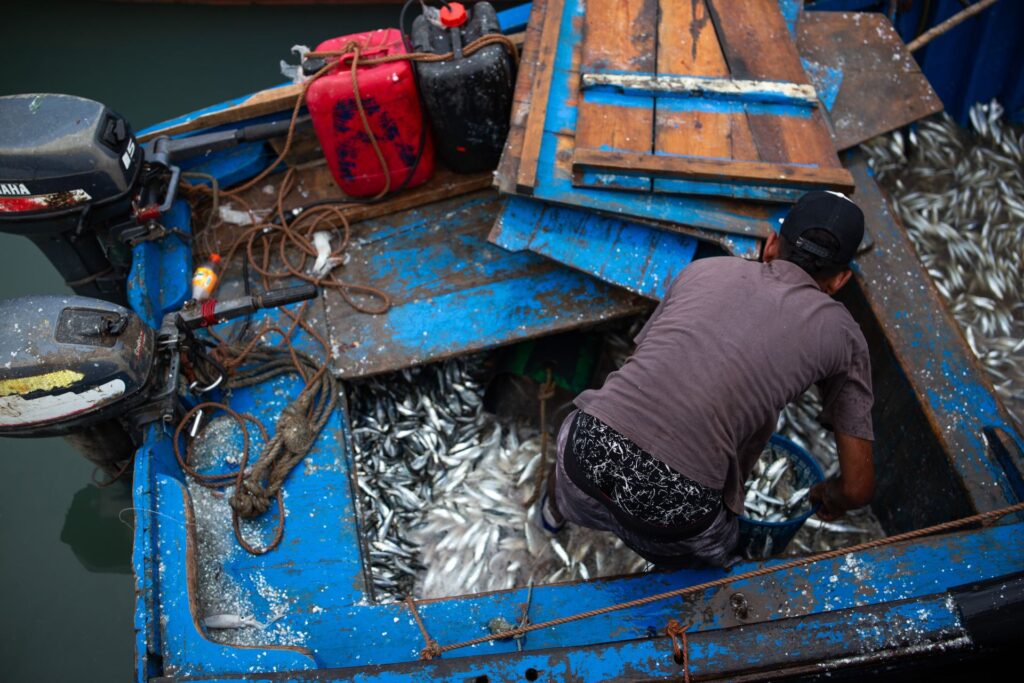
The territory of Western Sahara spans roughly 100,000 square miles of desert. It has a history marred by occupation, beginning with Spanish settlers in the 19th century, who dubbed the territory the “Spanish Sahara” in 1934. By 1957, Morocco (which itself only became independent from France in 1956) began claiming control over Western Sahara, resulting in skirmishes between Spanish soldiers and the Moroccan army. Its neighbor Mauritania also rushed to claim ownership as phosphate mines were discovered across Western Sahara in the early 1960s.
After Spain ceded Western Sahara to the Kingdom of Morocco in 1975, the former colonizer negotiated for fishing rights along its teeming coasts. Spain possesses Europe’s largest fishing fleet and remains an active presence in Western Saharan waters. Yet for 16 years, active fighting between Morocco and the Polisario Front stifled much of Western Sahara’s economy. The modern fisheries sector only took off around 1991 with the ceasefire following the mutual acceptance of a U.N. peace proposal.
When former President Donald Trump announced American support for Moroccan sovereignty over Western Sahara in December 2020 to bring Morocco into the Abraham Accords, part of a series of deals to normalize relations between Arab-majority countries and Israel, it catalyzed Spain’s shift in alliance. The former colonizer went back on its calls for a U.N.-brokered settlement, officially recognizing the kingdom’s plan to govern Western Sahara.
Western Sahara’s coasts provide nearly 73% of Morocco’s annual coastal and artisanal catches, according to the most recent governmental data in 2020 — the equivalent of 63% of Morocco’s national total. Its waters, extending to the Spanish Canary Islands, contain some of the best fish stocks in the region. As of 2020, 104 of the 196 fish-freezing companies registered in Morocco are in fact based in Western Sahara.
But the acute lack of regulation and control means that much of the fish caught and transported in Western Saharan waters is never reported. Erik Hagen, chair of the nongovernmental organization Western Sahara Resource Watch, said that any statistics from the Moroccan government are difficult to trust. “They should be considered conservative figures,” he said. “Morocco is really poor on regulation and control.”
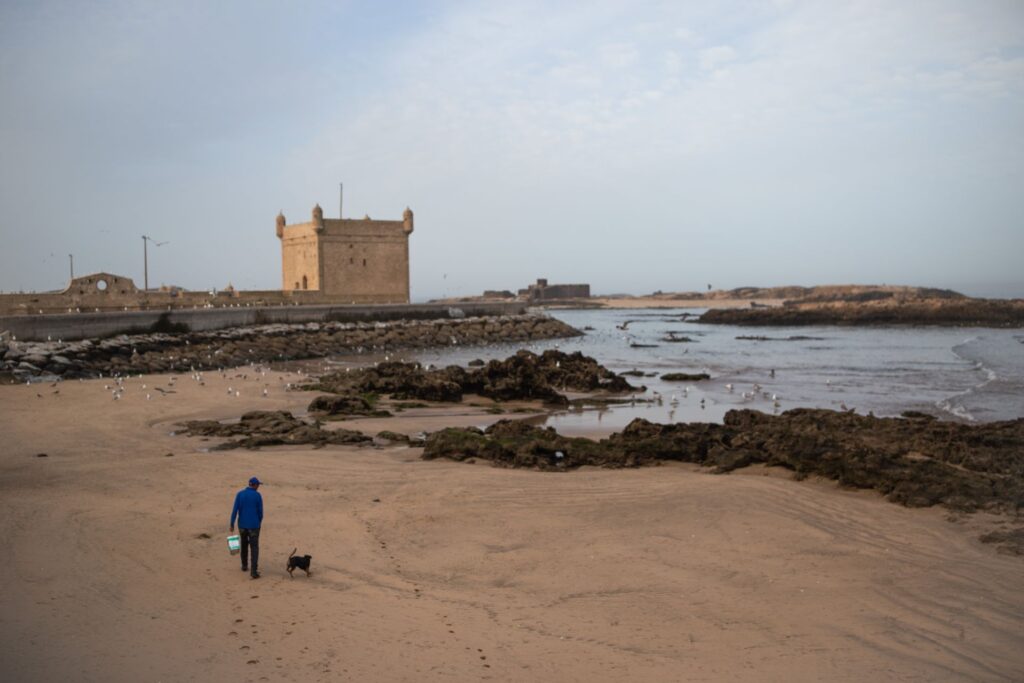
Fish caught in Western Sahara’s waters may be landed further north in Morocco, by fleets that travel up and down the coast. There’s also a system of trucks that shuttle fish by land to places in Morocco, such as Agadir or Tan-Tan. Fleets of cargo boats wait for the fishermen out at sea, too, ready to ship the catches directly to their export destination countries.
“For me, the question about Western Sahara or Morocco is a question about taking benefits,” said a Sahrawi from Laayoune, the occupied territory’s unofficial capital, who wishes not to be identified for security reasons. “For fishing, the Moroccan government offers many projects and grants for young people from Sahara,” he continued. “Most people don’t care about politics when it comes to fishing, once they make money. Small-scale fishers in Laayoune port, for instance — they don’t think about the agreement.”
The Laayoune local said that some Sahrawis even pool together fishing permits from the Moroccan government, selling those rights to Moroccans eager to work at the major Western Saharan ports in Laayoune or Dakhla.
According to Hagen, continuing the fisheries industry in Western Sahara under the present terms is more to the detriment of Sahrawis than their benefit.
Hagen said that many companies want to do the right thing but governments generally do not provide advice to businesses that accurately reflects international law; in this case, on the EU regulations surrounding Western Sahara. “The challenge falls on Sahrawis, civil society and the courts to educate the banks and investors on what international law entails for investments.”
But the legitimacy of trade permits in Western Saharan waters has remained murky, since Morocco — according to the EU Court of Justice — has no legal right to be there.
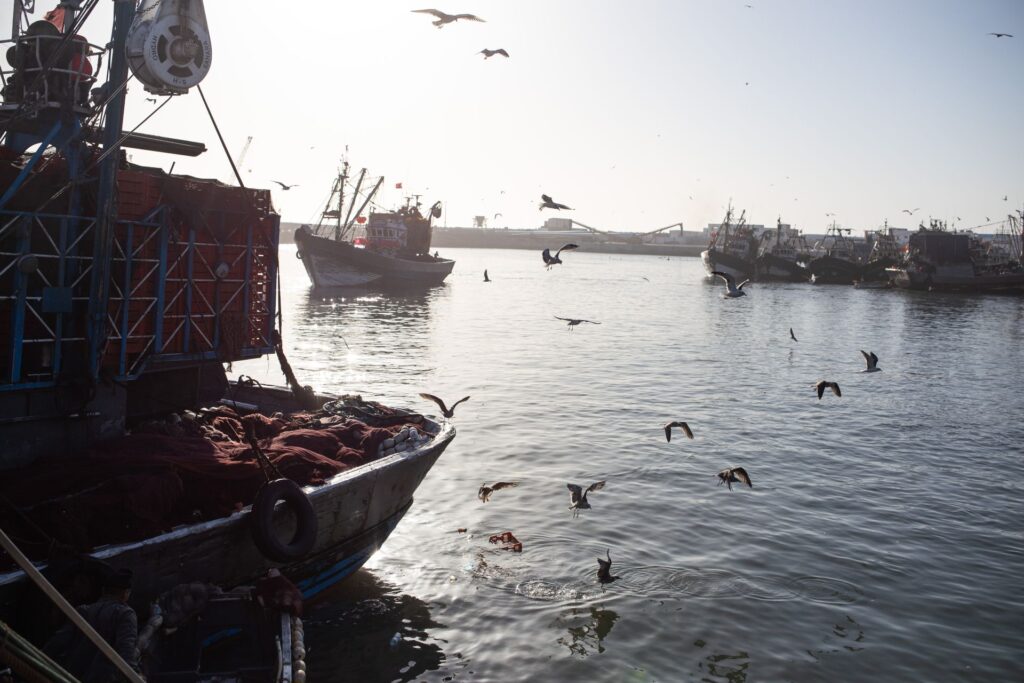
Western Sahara Resource Watch has convinced dozens of companies to withdraw from Western Sahara after clarification of the political implications of sourcing there. In 2018, the Canadian phosphate mining company Nutrien was blacklisted by investors, including the Norwegian Government Pension Fund, Danish bank Nykredit and several Swedish pension funds, for violating ethical investment policies with its involvement in occupied territories.
The Norwegian seismic survey company SeaBird claims it was misled by being told that it was to work “in Morocco” when taking on an assignment in Western Sahara. “We admit having done a mistake,” wrote CEO Dag Reynolds in a public statement. “It feels very uncomfortable having contributed in supporting an occupation power.”
Yet the attractiveness of Western Sahara’s abundant resources means that the list of companies involved remains extensive. The Polisario Front has repeatedly spoken out, saying Morocco has no right under international law to act on behalf of Western Sahara. “The license given by the Moroccan occupying forces … is null and void, and has no legal value,” read a statement from early June 2023 published on SPS, the Polisario’s media outlet. Requests for comment sent to multiple Moroccan state agencies by New Lines went unanswered.
King Mohammed VI of Morocco remains uncompromising on the status of Western Sahara, despite claiming that he is still committed to finding a “peaceful solution.” On Nov. 6, 2021, the king delivered a speech on the 46th anniversary of the Green March (a mass demonstration by Moroccans that forced colonial Spain to hand over Western Sahara). “The Moroccanness of the Sahara is an immutable and indisputable fact,” he announced. “Morocco is not negotiating over its Sahara.”
For years, the King has leveraged the migration conundrum against the EU, which has relied on the kingdom to stem migration originating from its shores. When the EU Court of Justice challenged Morocco’s claims to Western Sahara in terms of trade agreements, the agricultural ministry stated: “Any obstacle in the application is a direct attack on thousands of jobs … on both sides, and risks the resumption of migratory flows, which Morocco has succeeded in containing through a deliberate, sustained effort.” In February 2016, Morocco temporarily suspended diplomatic relations in response to an EU court ruling that concluded that an agricultural trade agreement between the EU and Morocco cannot include Western Sahara.
The Polisario Front has explicitly requested participation in negotiating trade and fisheries with EU institutions. “They want to have direct relations with the EU,” said Hagen. “Just like the Palestinians do. They want a seat around the table.”
Sign up to our mailing list to receive our stories in your inbox.



